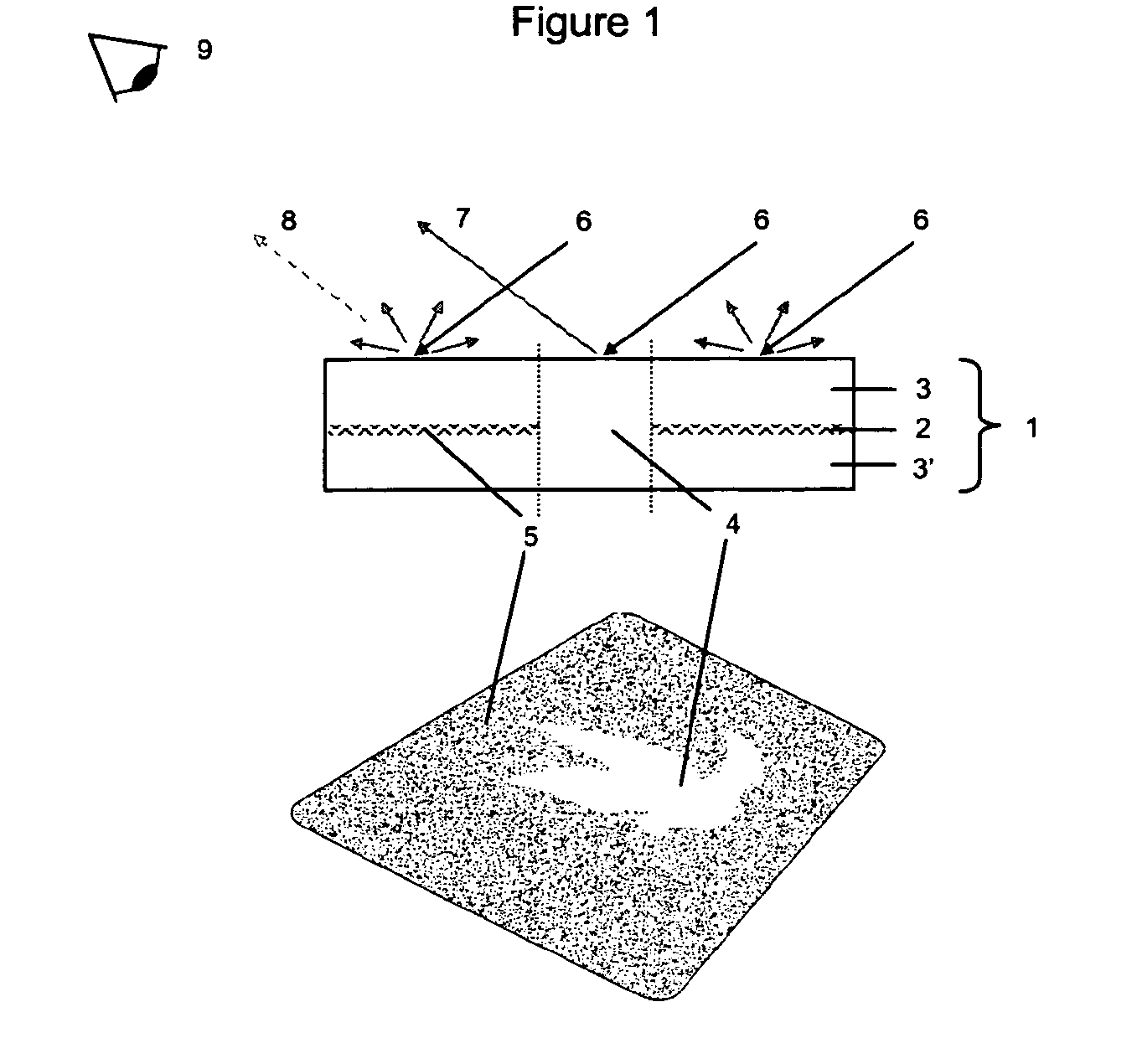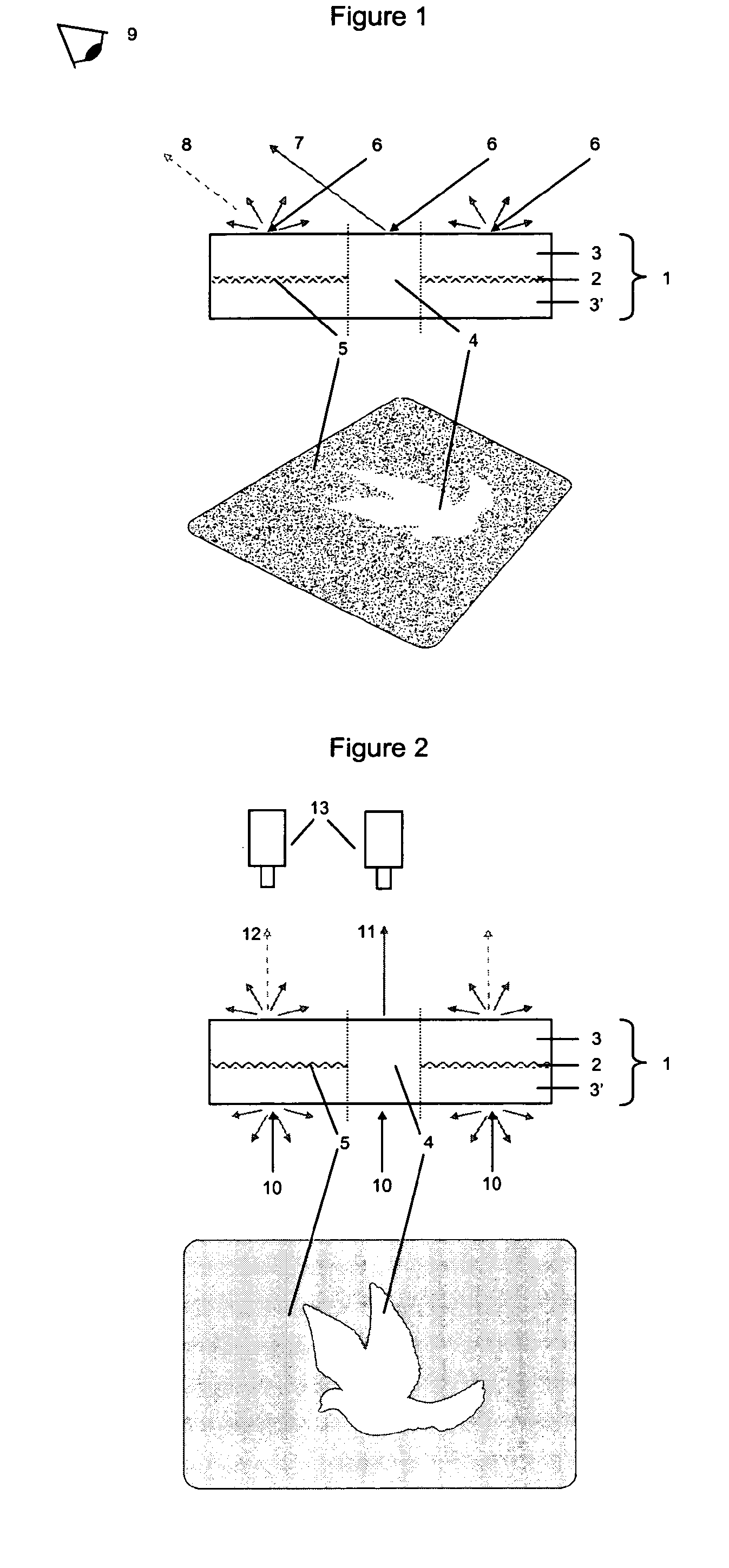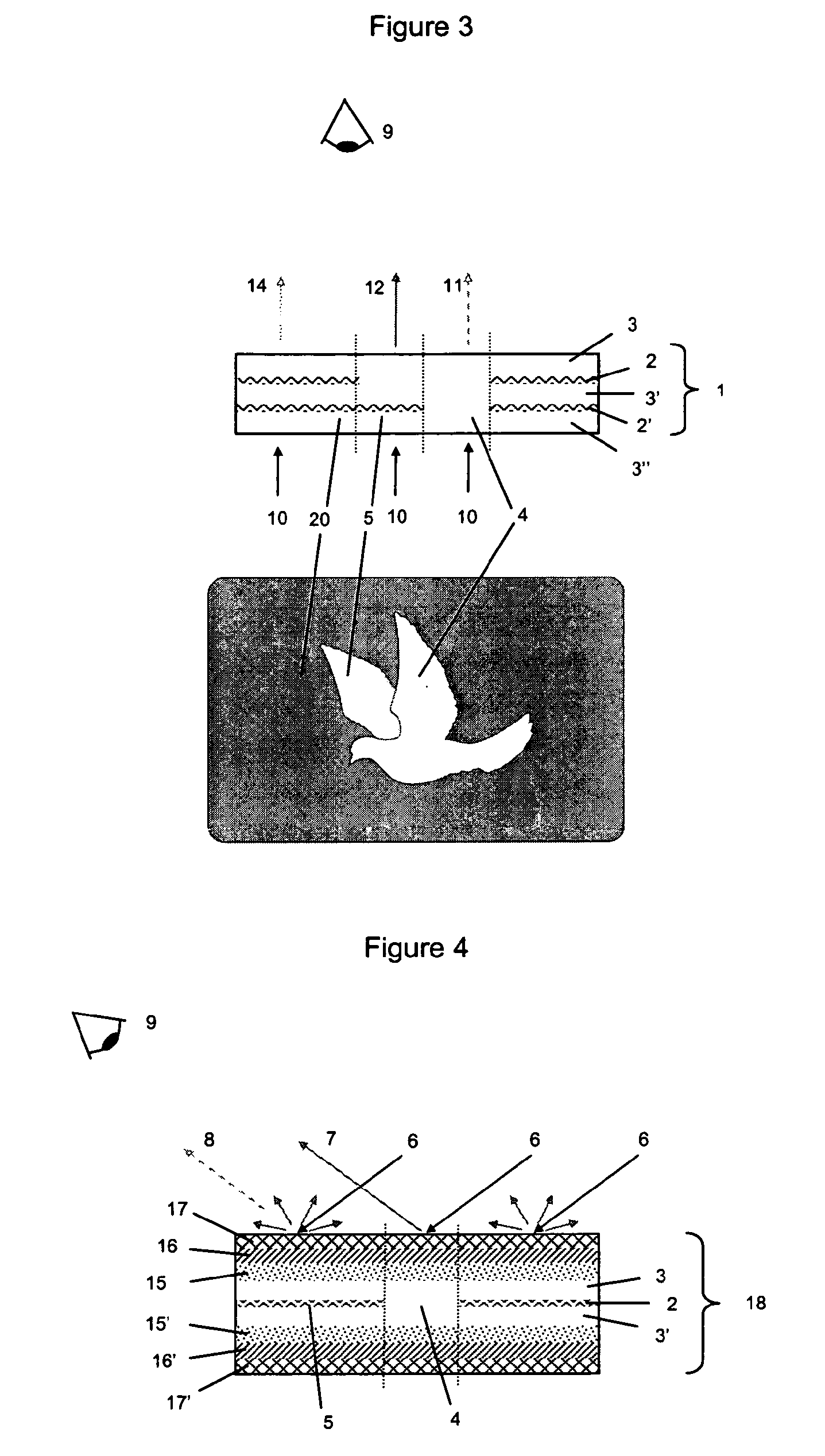Method of checking the authenticity of a document with a co-laminated fabric layer inside
a technology of authenticity and fabric layer, applied in the field of authenticity security documents, can solve the problems of uneven wear at the location of the cut, failure to test, and collapse regions on the surface, and achieve the effect of improving the known security elements of documents
Inactive Publication Date: 2013-12-31
HID GLOBAL GMBH
View PDF5 Cites 3 Cited by
- Summary
- Abstract
- Description
- Claims
- Application Information
AI Technical Summary
Benefits of technology
The present invention improves security elements for documents by adding a fabric layer that creates a microscopic variation at the surface of the document, resulting in an art of reflective watermark. Co-laminating fabric layers allows for a multiple watermark that has both surface relief and opacity effect without adding any volume to the body of the document. The invention also includes a method of authentication of a document using this security feature. The method involves illuminating different spots on a surface of the document and detecting the light emitted by each spot while determining if each spot is located at the vertical of a zone with or without fabric material inside the document. This method is based on the effects of non-woven material inside the document's body modifying both opacity and surface relief of the local surface area (spot) situated directly above. Incident light on such surface areas will also be reflected, transmitted, scattered and / or absorbed in a different way than on surface area situated just above a zone of the fabric layer without fabric material.
Problems solved by technology
Such documents are able to fulfil the need of a 10 years lifespan but comprise no watermarks since such an element is difficult to be created in a synthetic material.
However, such cuts have brought collapse regions in the surface and also uneven wear at the location of the cut.
For these reasons these tests were unsuccessful.
Both have their drawback, mainly related to pricing, yield and control of the final quality of the surface.
Method used
the structure of the environmentally friendly knitted fabric provided by the present invention; figure 2 Flow chart of the yarn wrapping machine for environmentally friendly knitted fabrics and storage devices; image 3 Is the parameter map of the yarn covering machine
View moreImage
Smart Image Click on the blue labels to locate them in the text.
Smart ImageViewing Examples
Examples
Experimental program
Comparison scheme
Effect test
first embodiment
[0023]FIG. 1 illustrates the invention with a test of authenticity of a document in reflection mode.
second embodiment
[0024]FIG. 2 illustrates the invention with a test of authenticity of a document in transmission mode.
third embodiment
[0025]FIG. 3 illustrates the invention with a test of authenticity of the document containing a plurality of fabric layers.
[0026]FIG. 4 illustrates a third embodiment of the invention with a test of authenticity of a document in reflection mode
the structure of the environmentally friendly knitted fabric provided by the present invention; figure 2 Flow chart of the yarn wrapping machine for environmentally friendly knitted fabrics and storage devices; image 3 Is the parameter map of the yarn covering machine
Login to View More PUM
 Login to View More
Login to View More Abstract
A method to test the authenticity of a document (1), such as an ID, a passport or a card, protected against forgery, wherein it comprises at least an inner co-laminated fabric layer (2) forming an optical watermark. This layer presents cuts, and so separated zones with fabric material and other zones without fabric material, forming well recognizable forms or pictures. Co-laminating one or a plurality of such fabric layers inside of the document body allows to create a multiple watermark having both surface relief and opacity effect, without adding any volume to the body of the document.
Description
CROSS REFERENCE TO RELATED APPLICATIONS[0001]This application is a national stage application under 35 U.S.C. 371 of PCT Application No. PCT / EP2009 / 054063 having an international filing date of 6 Apr. 2009, which designated the United States, which PCT application claimed the benefit of European Patent Application No. 08154413.2 filed 11 Apr. 2008, the entire disclosure of which is incorporated herein by reference.TECHNICAL FIELD[0002]The present invention concerns a method for checking the authenticity security documents, for example passports, ID and other similar security documents. It also relates to the document itself, which contains a co-laminated fabric layer forming a watermark to be checked.BACKGROUND ART[0003]It is known in the art to provide security documents, such as for example ID, passports and other similar documents with different security features. A well known security feature is the watermark that is created during the creation of a paper substrate by specific p...
Claims
the structure of the environmentally friendly knitted fabric provided by the present invention; figure 2 Flow chart of the yarn wrapping machine for environmentally friendly knitted fabrics and storage devices; image 3 Is the parameter map of the yarn covering machine
Login to View More Application Information
Patent Timeline
 Login to View More
Login to View More Patent Type & Authority Patents(United States)
IPC IPC(8): G06K9/74
CPCG07D7/12G07D7/002G07D7/0034
Inventor HECKER, HERMANNGRIESBACH, ANDREAS
Owner HID GLOBAL GMBH
Features
- R&D
- Intellectual Property
- Life Sciences
- Materials
- Tech Scout
Why Patsnap Eureka
- Unparalleled Data Quality
- Higher Quality Content
- 60% Fewer Hallucinations
Social media
Patsnap Eureka Blog
Learn More Browse by: Latest US Patents, China's latest patents, Technical Efficacy Thesaurus, Application Domain, Technology Topic, Popular Technical Reports.
© 2025 PatSnap. All rights reserved.Legal|Privacy policy|Modern Slavery Act Transparency Statement|Sitemap|About US| Contact US: help@patsnap.com



